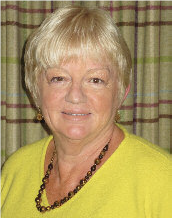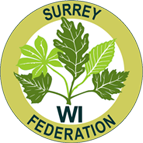
Many of you enjoyed the inspiring speakers at our March Annual Council Meeting and the similarly engaging speakers at the NFWI Annual Meeting in Liverpool in June. How fortunate we are, as WI members, to have the opportunity to hear so many excellent speakers, including those at our own WIs.
Communication in the form of public speaking can be daunting and is often a barrier to members’ participation in committee work both with their own WI and the Federation. Because of this they are missing out on an enriching experience. What a shame this is, and something that I wish to remedy.
You may well think that as a university lecturer, I learned my trade at work, but you would be wrong, because it was a result of both nurture and nature. My grandfather was a grocer. He could sell anything to anyone, and what’s more, his customers would be delighted with what they had bought, especially as there was always a little extra thrown in.
Another role model was my father, a headteacher. Whether it was addressing an audience or selling raffle tickets for charity outside the supermarket, he just ‘had it’, and I was inspired.
But where did I gain my experience? I attended Sunday School and regularly read in chapel. It became second nature. As a teenager, I was inspired by my English teacher Miss Smith, who lost the love of her life in WW2, and so dedicated her life to us. She read with great enthusiasm, vitality and drama. So much so that long before she reached a humorous episode she would be laughing helplessly . She too was inspiring.
But does this skill of public speaking come naturally to us? We might have that innate ability, but it can be learned. Whatever our experience we still have to make that first vital step, to speak to the meeting. Very many of you have already taken this step, but for some, this is a barrier to participation. Its time for us now to challenge and overcome this barrier. So how can we do this?
Prepare and practice
Nerves — well they are both a curse and a blessing. I was always nervous when I addressed a class of students for the first time. The adrenaline was both welcome and necessary, and I promised myself that if I ever didn’t feel nervous in that situation, then I should give up teaching. Fortunately, the ‘nerves’ stayed with me and I benefited from them, whether in the lecture room or at the Federation Centenary Service at Guildford Cathedral.
But are we all capable of this? I certainly didn’t think that I was. So how should we proceed?
The first step is to know your audience. Someone offered me a tip recently of imagining everyone in the hall naked!? I don’t think that we need to get that familiar with our audience! The next step is to prepare, prepare, prepare, and practice, practice, practice.
I have been told that my garden grows well because I practice my presentations by reading them aloud to it. Have a go. On the day, keep the microphone close to your mouth. Listen to yourself through the speaker and speak slowly and clearly. Master the technology.
Performance
If you are nervous about using PowerPoint (PP) then don’t use it. It can be a distraction rather than an aid if used poorly. Instead, use a few select images as a memory prompt rather than acres of potentially illegible text.
You are now in front of your audience. Be aware of them, make eye contact, ensure that you embrace everyone in the room with both gesture and eye, and also with your content — avoid acronyms and colloquial or cliquey speech.
It’s now time to speak. It’s all an act, a performance, you can be whoever you want to be. Picture yourself as that person — think shoes, clothes, makeup, hair. Did you have shoe envy when Alieda Moore walked onto the stage? I did, but I could never have walked in them, so choose carefully!
Your audience is your friend and they are there because they want to be there. They are keen to hear what you have to say. Be friendly, speak with honesty and smile when appropriate. If you mention an individual, make eye contact. A positive response from them will boost your confidence. Know what you want to say and keep it simple and concise.*
A recent article on the BBC news website included a fascinating composite image of Volodymyr Zelensky. In March 2022 he addressed ten parliaments across the world via social media, for which he received standing ovations. What fascinated me, beyond his brutal message, was that as an actor, he knew how to engage with his different audiences, not only in his content which recognised significant cultural differences and histories, but also through gesture. This was a fascinating insight into the value of communication.
This emphasises the fact that communication is not only through word but critically also through gesture. An emphasis on diverse modes of communication has been in the media recently because of deaf awareness week and the proposal to Parliament to give British Sign Language legal recognition.
Makaton bursaries
As a grandparent of a child with complex needs, I know at first hand the value of communication through gesture, and in our case through Makaton. Makaton is a form of sign language that is familiar to many children as it is integrated into many BBC children’s programmes. It is an international language and used by people with a wide range of communication challenges, and those for whom English is a second language.
It has a particular relevance currently as a vehicle through which to communicate with our Ukranian guests, who may have limited English. It is for these reasons that the Federation will be offering bursaries to members to undertake a level 1 and 2 Makaton training course. Watch this space.
Why am I telling you this? Because I have been told that one of the key reasons members are reluctant to take on WI roles is because they have a fear of speaking in public. So, I invite you to speak to your meeting, to welcome that adrenaline rush, to gain pleasure from doing it, and to open a gateway for yourself to new experiences with both your own WI and the Federation.
* Please let the office know if you would like us to put on some public speaking workshops.
Carol A. Gartrell
Federation Chairman
back to News


